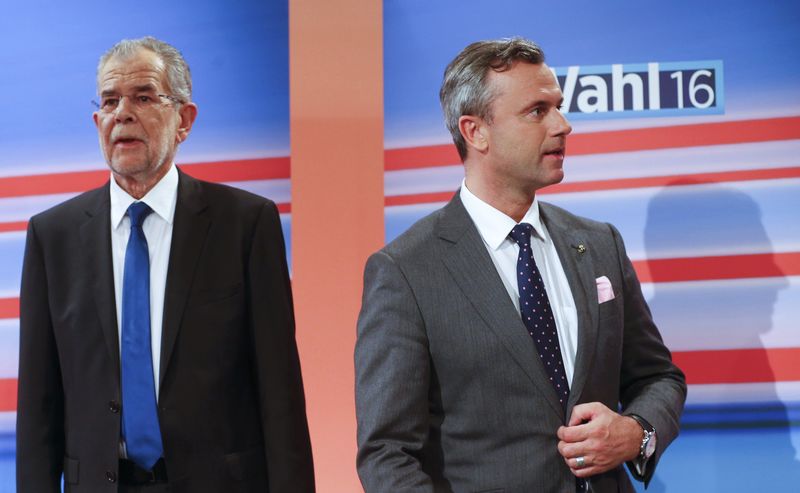By Francois Murphy
VIENNA (Reuters) - Austria counted hundreds of thousands of postal ballots on Monday to determine whether the knife-edge presidential election would produce the European Union's first far-right head of state.
A run-off election on Sunday was too close to call, with anti-immigration Freedom Party candidate Norbert Hofer holding a wafer-thin lead over leftist independent Alexander van der Bellen.
Austria's presidency is a largely ceremonial role but with important powers such as the ability to dismiss the cabinet.
Regardless who wins, the election is a watershed for anti-immigration parties across Europe and puts Austria at the forefront of a populist surge driven by the continent's migration crisis and concerns about growing economic hardship.
Austria is a relatively prosperous country with low unemployment but it has been at the center of a record influx of refugees from the Middle East and resentment toward the two centrist parties that have dominated politics since the end of World War Two has grown.
About 700,000 postal ballots, more than 10 percent of the voting population, will determine the winner. The Interior Ministry is due to announce results after 1330 GMT.
The mail ballots are expected to favor van der Bellen. But even if he is able to make up the gap with Hofer, the Freedom Party signaled on Sunday it may not accept defeat.
"We have definitely won," Hofer told supporters.
His party has said it will be on the lookout for signs of foul play involving postal ballots.
"They are often counted in a rather special way that means we might not be completely in front," Hofer said, without elaborating.
UNSETTLED
Sunday's provisional result, not including postal ballots, showed Hofer ahead with 51.9 percent to van der Bellen's 48.1 percent. A projection by the SORA institute for broadcaster ORF showed both candidates tied on 50 percent.
A spokesman for SORA said postal ballots tend to favor the more highly educated. The institute's election-day polling showed 81 percent of voters with a university degree had backed van der Bellen and 86 percent of workers voted for Hofer.
The vote in Austria, a country of 8.5 million people, has unsettled the political establishment elsewhere in Europe, particularly in neighbor Germany where a new anti-immigration party, the Alternative for Germany (AfD), is on the rise.
In France, the National Front of Marine Le Pen is leading in polls ahead of a presidential election next year and across the Channel, the UK Independence Party is lobbying for Britain to leave the European Union ahead of a referendum on June 23.
Hofer, 45, has described himself as a center-right politician and told voters not to believe suggestions from other parties that he would be a dangerous president.
His party has its roots in Austria's Nazi past, a history the country has not confronted as openly as Germany.
The Freedom Party portrays itself as an outsider taking on Austria's two dominant parties - the Social Democrats (SPO) and the conservative People's Party, which rule in coalition.

If Hofer wins the election, those parties will come under scrutiny for not calling on their supporters to back van der Bellen, a 72-year-old former leader of the Greens party.